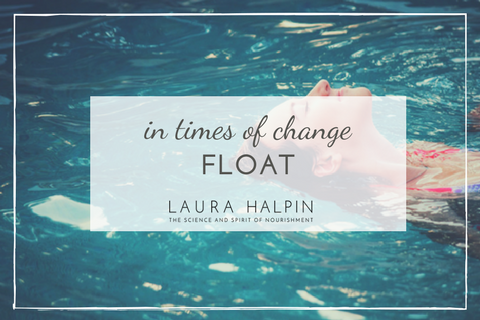
In times of change, float.
Remembering to float
Last month, my oldest child flew the coop, headed off for college to begin a new chapter of her life. It’s been a transition for all of us, filled with layers of excitement, fear, loss, and newness. I’ve been thinking a lot about the process of change, which on every level of existence, is always happening, no matter if we embrace or resist it. Physically, at the level of our cells, we literally are not the same person as we were last year, or even last week. For example, our bodies replace our gut cells every two days and our skin cells every two weeks. Our brains grow and change in response to what we do, think and feel every day.
By grand design, we grow and evolve. Yet as humans, we cling to what was, which according to Buddhist tradition, is the source of all suffering.
In her new book, Rising Strong, Brene Brown writes about how in times of change, there is a period of murkiness and disorder that we must move through. We have left the shore of what was, but haven’t yet reached the solid ground of the distant shore. During that time, there is no ground beneath our feet, no familiarity, nothing to hold onto. It’s scary as hell, and so our natural reaction is to frantically swim back to familiar ground.
This period of murkiness and disorder is when our inner voices are at their snarliest. I don’t know about you, but in my life, fear usually manifests in some nasty self-criticism. The tapes are familiar, but convincing nevertheless.
In Kelly McGonigal’s Neuroscience of Change, she writes that according to wisdom traditions, to accept and enthusiastically participate in the process of change is to bring happiness. She writes that we can make the process of change easier by approaching times of change with three basic attitudes:
- Willingness and courage to go beyond our comfort zone;
- A quality of compassionate self-awareness. This means paying attention to what we do habitually to resist change; and
- A sense of surrender. This sense of surrender is a basic acknowledgement that the flow of life is bigger than our individual will.
An image to support you when you’d rather swim frantically back to shore
I’ve been thinking of the image of floating to help me muster up these necessary attitudes. I think of the ocean as the flow of life. Clinging to the rocky shore of the past will only get us banged up in the surf. Swimming frantically, or trying to control the outcome in times of change, will only waste our energy. Instead, turning onto our backs and floating is an act of surrender and trust.
When you find yourself in a mode of resistance and control, muster up this image of surrender. Imagine yourself relaxed floating on your back in the thick salt water,your face warmed by the sun. This imagined posture suggests a willingness to go beyond your comfort zone, an easing of habitual fear responses and a nod to Life that you are in good hands.
A poem for good measure
This is a poem I used long ago when I taught middle school as an example of metaphor. Just came to mind.
First Lesson By Phillip Booth
Lie back daughter, let your head
be tipped back in the cup of my hand.
Gently, and I will hold you. Spread
your arms wide, lie out on the stream
and look high at the gulls. A dead-
man’s float is face down. You will dive
and swim soon enough where this tidewater
ebbs to the sea. Daughter, believe
me, when you tire on the long thrash
to your island, lie up, and survive.
As you float now, where I held you
and let go, remember when fear
cramps your heart what I told you:
lie gently and wide to the light-year
stars, lie back, and the sea will hold you.
Aaaah…



